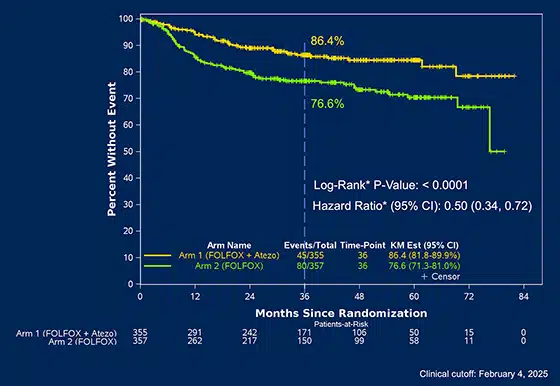Clinical Trials
Clinical trials are research studies that are conducted in human subjects to evaluate new ways to prevent, detect, treat, or manage cancer or other diseases. Through clinical trials, researchers are able to determine whether or not new treatments, such as drugs, procedures, or medical devices, are safe and effective, and whether or not they work better than current treatments. Learning more about clinical trials can help you make an informed decision about whether or not to participate in one as part of your colorectal cancer treatment.
Possible Benefits of Participating in a Clinical Trial
If you have a disease such as colorectal cancer, there could be personal benefits such as:
A potential early access to a new treatment with positive results; the treatment may cure or control your condition or improve your quality of life; you may receive more expert medical care from the research teams involved in the clinical trial.
In addition, participating in a clinical trial can help others by advancing medical research.
Possible Benefits of Participating in a Clinical Trial

If you have a disease such as colorectal cancer, there could be personal benefits such as:
A potential early access to a new treatment with positive results; the treatment may cure or control your condition or improve your quality of life; you may receive more expert medical care from the research teams involved in the clinical trial.
In addition, participating in a clinical trial can help others by advancing medical research.
Possible Risks of Participating in a Clinical Trial
Because clinical trials often compare a new drug to an approved drug or combination of drugs that are part of the current standard of care, you may not always receive a new treatment. Even if you get a new drug, it may not help you. It may be less effective than the standard of care. As with any treatment, there is the risk of serious short- or long-term side effects.
Reducing Your Risk
Before you participate in a clinical trial, it is very important that you understand what is involved and give your informed consent. Talk to your doctor to best understand the risks and benefits so you can make an informed choice about participating.
Types of Clinical Trials
This type of trial looks at whether a particular treatment can help prevent cancer. These trials can be conducted in the general population or in people who have a higher than normal risk of developing a certain type of cancer, such as those with a family history of the disease.
Screening trials involve testing people for early signs of cancer before they have symptoms. These trials can be done in the general population or in a group of people who are at higher than normal risk of developing cancer. Screening trials may look at the effectiveness of a new screening test compared to standard tests.
Treatment trials are conducted in stages or phases. In trials that compare two or more treatments, participants are randomly assigned to a specific treatment group. Randomized trials give researchers the most reliable information about how well a new treatment works.
Types of Clinical Trials
Finding the Right Clinical Trial
Talk to your healthcare team to find out if participating in a clinical trial is right for you. You can also access the clinical trial databases below or contact a clinical trial navigator to learn more and find trials specific to your needs and location.
Clinical Trial Navigator Services in Canada
Canadian Cancer Clinical Trials Network
Clinical Trials Navigator provided by the Windsor Regional Hospital
The Clinical Trials Navigator is designed to help cancer patients search for and connect with clinical trials for which they may be eligible. The patient begins by completing an informed consent form, or their physician can complete a referral form. The patient is connected to the Clinical Trials Navigator, which helps them search for all eligible trials.
Contact the Clinical Trials Navigator at clinicaltrialsnavigator@wrh.on.ca;
P: (519) 253-3191 ext. 58583
Additional Clinical Trials Resources
New First-Line Treatment Option for BRAF V600E–Mutant Metastatic Colorectal Cancer
January 2026 Some individuals with metastatic colorectal cancer have a specific genetic change called BRAF V600E. This mutation is linked to faster-growing cancer and has traditionally been harder to treat. Researchers are working to find better first-line...
Impact of physical activity on fatigue and quality of life in non-metastatic colorectal cancer
January 2026 Results from the International ColoCare Study were presented at this year's ASCO GI Symposium and found that greater levels of physical activity in the first 2 years after a colorectal cancer (CRC) diagnosis were linked...
Is there a link between food preservatives and greater risk for cancer?
January 2026 A French study published in The BMJ found that higher intake of food preservatives, additives that are used in industrially processed foods and drinks to extend their shelf life, is linked to a modest increase in the risk of...
Nonoperative Management After Total Neoadjuvant Therapy in Rectal Cancer
A recent Italian phase II clinical trial (NO-CUT), published in The Lancet Oncology, evaluated whether some patients with stage II–III rectal cancer can safely avoid surgery after responding completely to upfront treatment. The study focused on patients with...
The ATOMIC study: atezolizumab plus FOLFOX chemotherapy significantly improves disease-free survival and reduces the risk of recurrence in stage III colon cancer
A new study - the ATOMIC trial - has found that adding the immunotherapy atezolizumab to standard chemotherapy (FOLFOX) significantly improves outcomes for people with stage III deficient DNA mismatch repair (dMMR) colon tumours - a type of cancer that makes up...
Microplastics in the Gut Linked to Colorectal Cancer-Like Patterns
November 2025 New research from the microONE project (CBmed GmbH, Austria) suggests that microplastics may impact gut health by altering the microbiome. Using human stool samples to create controlled gut cultures, researchers exposed the samples...










































